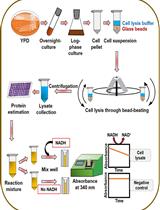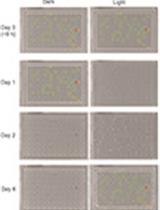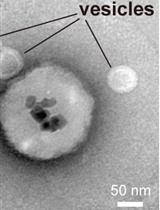- EN - English
- CN - 中文
Determination of Fungal Tolerance Index to Heavy Metals and Heavy Metal Resistance Tests
真菌对重金属的耐受指数的测定和重金属抗性试验
发布: 2021年11月05日第11卷第21期 DOI: 10.21769/BioProtoc.4218 浏览次数: 2903
评审: Alexandros AlexandratosElías Barquero-CalvoAnonymous reviewer(s)
Abstract
Fungal metallo-tolerance has been described in different species and plays an important role in bioremediation of contaminated environments. Metallo-tolerance is mainly documented by microdilution assays and agar well diffusion methods using equipment that can be expensive. The tolerance index can be calculated to determine the efficiency of a fungus to degrade and resist heavy metals. The present protocol is based on analyzing the tolerance index and minimum inhibitory concentration of the metallo-tolerance potential of culturable fungi on solid media. This can be calculated by daily measurements of colony size on agar supplemented with different concentrations of heavy metals. This method is an easy approach to determine fungal heavy metal resistance using simple laboratory equipment without spectroscopy.
Keywords: Heavy metals (重金属)Background
The increasing use of large amounts of toxic heavy metals in industrial processes, lack of proper disposal techniques, and their non-degradable nature is creating problems to the environment and in human health (Akhtar et al., 2013; Kumar et al., 2014). Some fungi have been isolated from anthropogenic contaminated sites and tolerate high amounts of toxic compounds (Rehman and Anjum, 2011). Furthermore, they can absorb, accumulate, and resist heavy metals (Fernández et al., 2017). Therefore, it is useful to describe protocols based on metallo-tolerant fungal capacity that serve as agents in the bioremediation process. One of the most common methodologies to determine heavy metal resistance is microdilution using flasks or polystyrene microtiter plates, broths, or synthetic culture media (RPMI 1640 medium), followed by spectrophotometry (Al-janabi, 2010). However, this method needs specific equipment and could be expensive for researchers from developing countries like Mexico (Calvillo-Medina et al., 2020). The agar dilution method proposed here works better for filamentous fungi and is an easy option to evaluate heavy metal fungal resistance (Iram et al., 2012). Based on this evidence, we reported a method to evaluate heavy metal resistance and to determine fungal tolerance index (TI), which could be calculated to identify the most tolerant microorganisms even with fastidious isolates. TI calculations can be used without agar dilution methods, e.g., when fungal isolates grow according to the microdilution method or the growth of filamentous bacteria in the presence of toxic compounds.
Materials and Reagents
Petri dish 100 mm diameter (SYM Laboratorios, catalog number: 7730SYM)
Pipette tips (Thermo Scientific, catalog numbers: 94300210 [1,000 μl]; 94300110 [100 μl] and 101-96R-Q [10 μl])
5 mm diameter sterile stainless steel punch (Avantor, catalog number: 10194-928)
0.22 μm sterile filters (Millipore, catalog number: SLGVV255F)
5 ml syringe for filter sterilization (JTC, catalog number: 05LSA-NPRO)
15 ml tubes (Axygen, catalog number: SCT-15ML-500)
Caliper (MIYUTOYO, catalog number: 531)
Erlenmeyer flask (Pyrex, catalog number: CLS44501L-1EA)
Fungal isolates to test
Culture media Potato dextrose agar (PDA) (Bioxon, catalog number: 210700)
Distilled water (Meyer, catalog number: HDS 0345)
Selected heavy metals, used as salts:
Chromium Cr(III) (CrCl3) (Sigma-Aldrich, catalog number: 450790)
Mercury Hg(II) (HgCl2) (Sigma-Aldrich, catalog number: 215465)
Lead Pb(II) (Pb(C2H3O2)2) (Meyer, catalog number: HDS 1955)
Equipment
Analytical balance (Ohaus Adventurer, catalog number: H-5276)
Pipettes (Thermo Scientific, catalog numbers: 4651270N [1,000 μl]; 4651230N [100 μl] and 4651280N [10 μl])
Autoclave (Evar, catalog number: EV-24)
Microbiological incubator (Thermo Fisher Scientific, catalog number: 50129111)
Microbiological safety cabinet (Thermo Fisher Scientific, catalog number: 1310TS1)
Software
T-test package ggpubr (R package version 0.1.7. https://CRAN.R-project.org/package=ggpubr)
R Core Team (https://www.Rproject.org/)
Procedure
文章信息
版权信息
© 2021 The Authors; exclusive licensee Bio-protocol LLC.
如何引用
Calvillo-Medina, R. P. (2021). Determination of Fungal Tolerance Index to Heavy Metals and Heavy Metal Resistance Tests. Bio-protocol 11(21): e4218. DOI: 10.21769/BioProtoc.4218.
分类
微生物学 > 微生物生理学 > 胁迫反应
生物科学 > 微生物学
您对这篇实验方法有问题吗?
在此处发布您的问题,我们将邀请本文作者来回答。同时,我们会将您的问题发布到Bio-protocol Exchange,以便寻求社区成员的帮助。
Share
Bluesky
X
Copy link













